The American Revolution articulated ideals of universal liberty, but for more than a century the United States had little political or diplomatic involvement with other nations. A republic in a world dominated by imperial monarchies, the United States avoided the dynastic quarrels, territorial disputes and diplomatic maneuvers that consumed the European state system through most of the nineteenth century. The United States provided the world with proof that a system of government based on the popular will and dedicated to the interests of ordinary people can be effective, but made no effort to export the ideals of the American Revolution or to promote the spread of republican institutions.
The United States entered World War I to defend freedom and democracy against tyranny and oppression, inspired by the ideals of the American Revolution and the memory of the Revolutionary War. The war transformed the nation’s political and cultural relationship with Europe and shaped a new determination to spread the principles of the American Revolution around the world. The war also changed the way Americans imagined and remembered the American Revolution.
“The American Revolution,” President Woodrow Wilson explained, “was a beginning, not a consummation, and the duty laid upon us by the beginning is the duty of bringing the things then begun to a noble triumph of completion.” A century after the United States embarked on that great crusade, the legacy of the American Revolution continues to shape our relationships around the world. “America has a great cause,” President Wilson reminded us, “which is not confined to the American continent. It is the cause of humanity itself.”
The Great Crusade opened the week of April 6, 2017—the one hundredth anniversary of the American declaration of war on Germany.
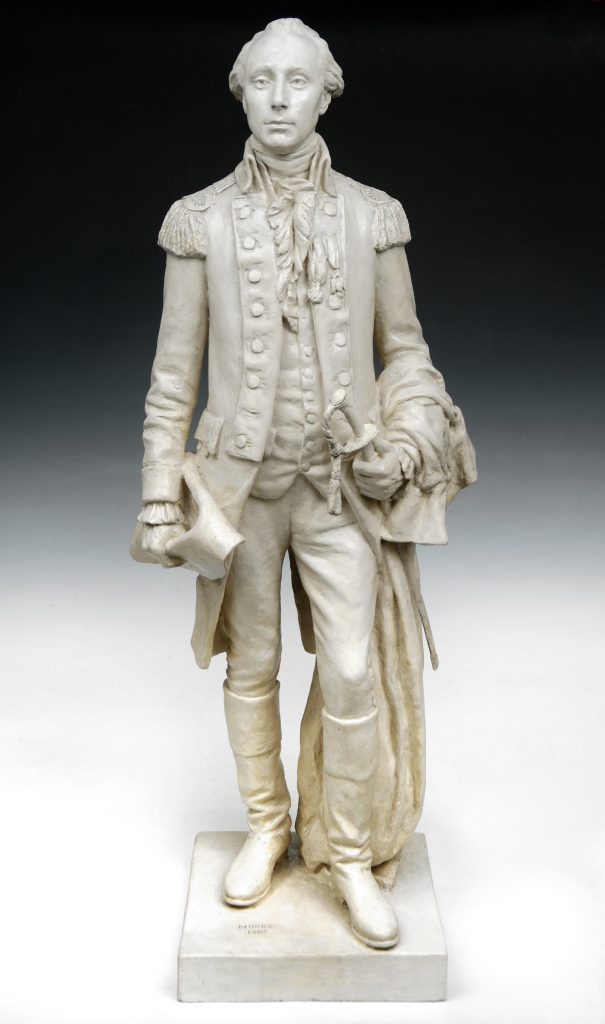
Lafayette
Samuel A. Murray (1869-1941)
1905The Society of the Cincinnati, Museum purchase, 2016
American enthusiasm for Lafayette increased as relations between the United States and France improved in the late nineteenth century. Sculptor Samuel Murray created this plaster statuette in 1905, depicting Lafayette in the uniform of a Continental Army major general, wearing the Eagle insignia of the Society of the Cincinnati. A champion of liberty in Europe and America, Lafayette became the emblem of American participation in World War I.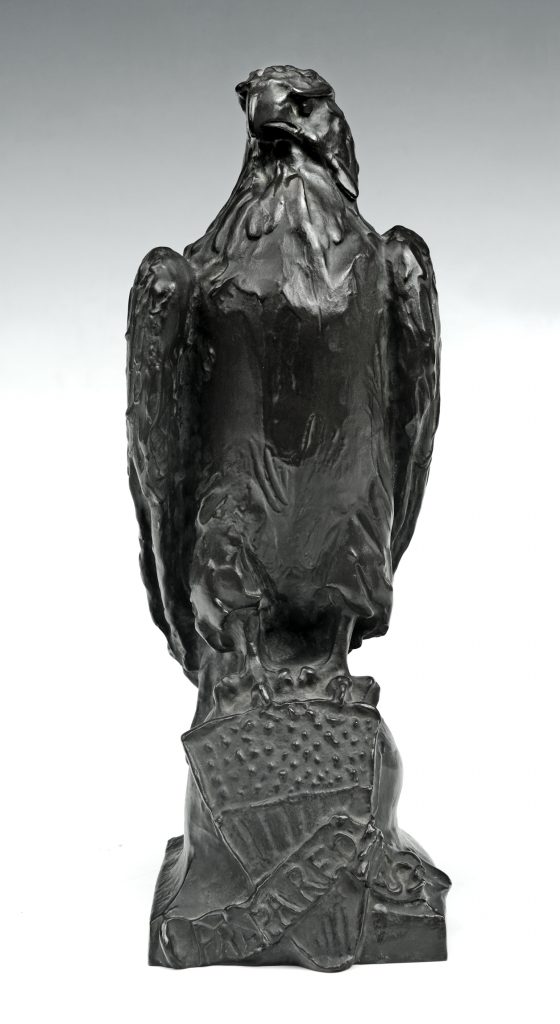
Eagle of Preparedness
Paul Wayland Bartlett (1865-1925)
Cast by the Griffoul Foundry, Newark, N.J., 1916The Society of the Cincinnati, Gift of Isabel Anderson, 1938
A vocal minority contended that the United States should expand the military and be prepared to intervene on the side of Britain and France. Preparedness advocates pointed out that the German army outnumbered the U.S. Army by more than twenty to one. Sculptor Paul Wayland Bartlett created this bronze eagle after the Lusitania disaster to symbolize preparedness. Larz and Isabel Anderson displayed the sculpture at Anderson House. The Andersons regarded the war as a disaster that threatened the fundamental values of Western Civilization.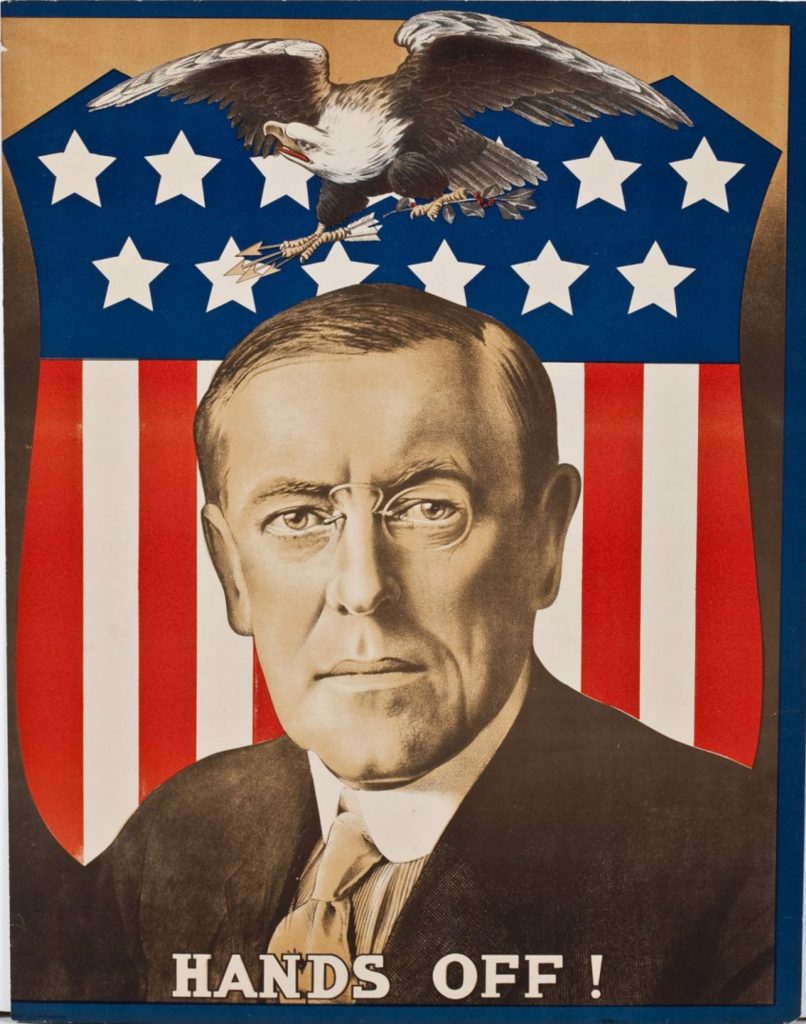
Hands Off!
New York: Underwood & Underwood, 1916Collection of Jack and Janet Warren
President Wilson opposed the Preparedness Movement, arguing that the National Guard was a reliable reservoir of military strength. Faced with a tough reelection campaign in 1916, Wilson embraced the rhetoric and symbols of the Preparedness Movement, as this campaign poster suggests, but he supported a much more limited expansion of the peacetime army.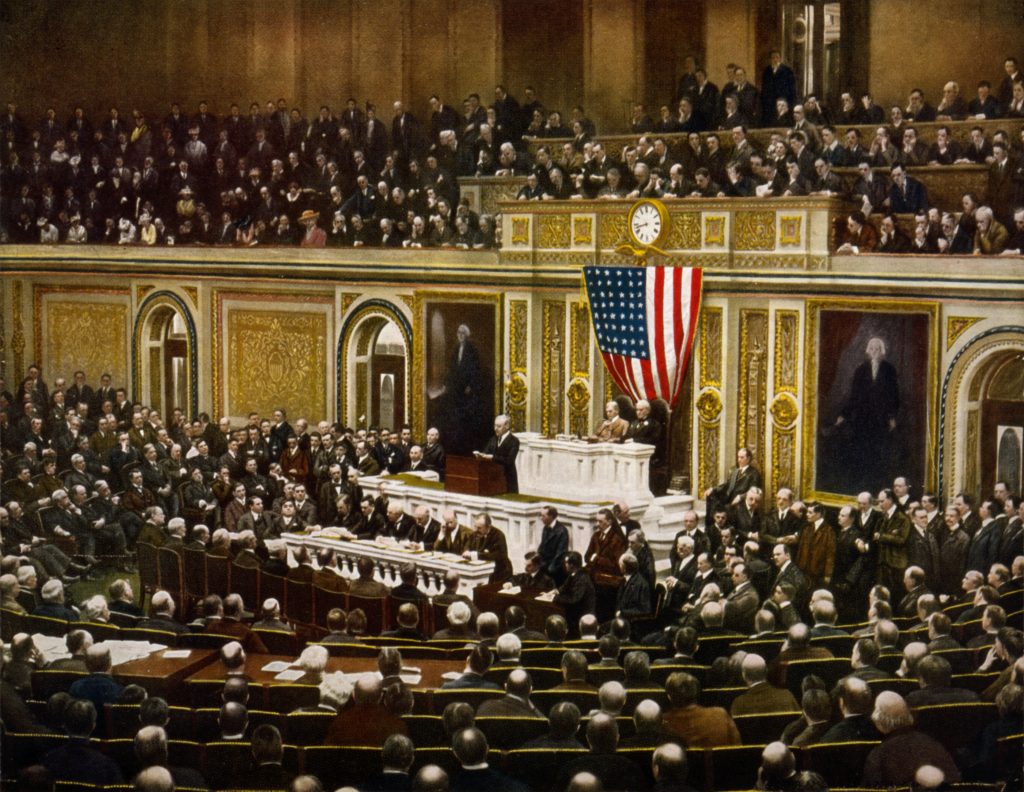
President Wilson addressing Congress
April 2, 1917Library of Congress
On April 2, 1917, President Wilson appeared before a joint session of Congress to ask for a declaration of war. Reaching back to the American Revolution, Wilson concluded that “the day has come when America is privileged to spend her blood and her might for the principles that gave her birth and happiness and the peace which she has treasured. God helping her, she can do no other.” Congress adopted a declaration of war on April 6, 1917.![Click for a larger view. Wake Up America Day, James Montgomery Flagg, [New York], 1917](https://www.americanrevolutioninstitute.org/wp-content/uploads/2018/08/Wake-up-America-Day-PE-L2016M172-e1536218837664-1024x720.jpg)
Wake Up America Day
James Montgomery Flagg
[New York], 1917The Society of the Cincinnati, Library purchase, 2016
The New York Mayor’s Committee on National Defense organized “Wake Up America Day”—held on the anniversary of the Battles of Lexington and Concord—to encourage army enlistments. The committee hired James Montgomery Flagg to design this poster depicting a female Paul Revere emerging from the darkness to call the country to arms.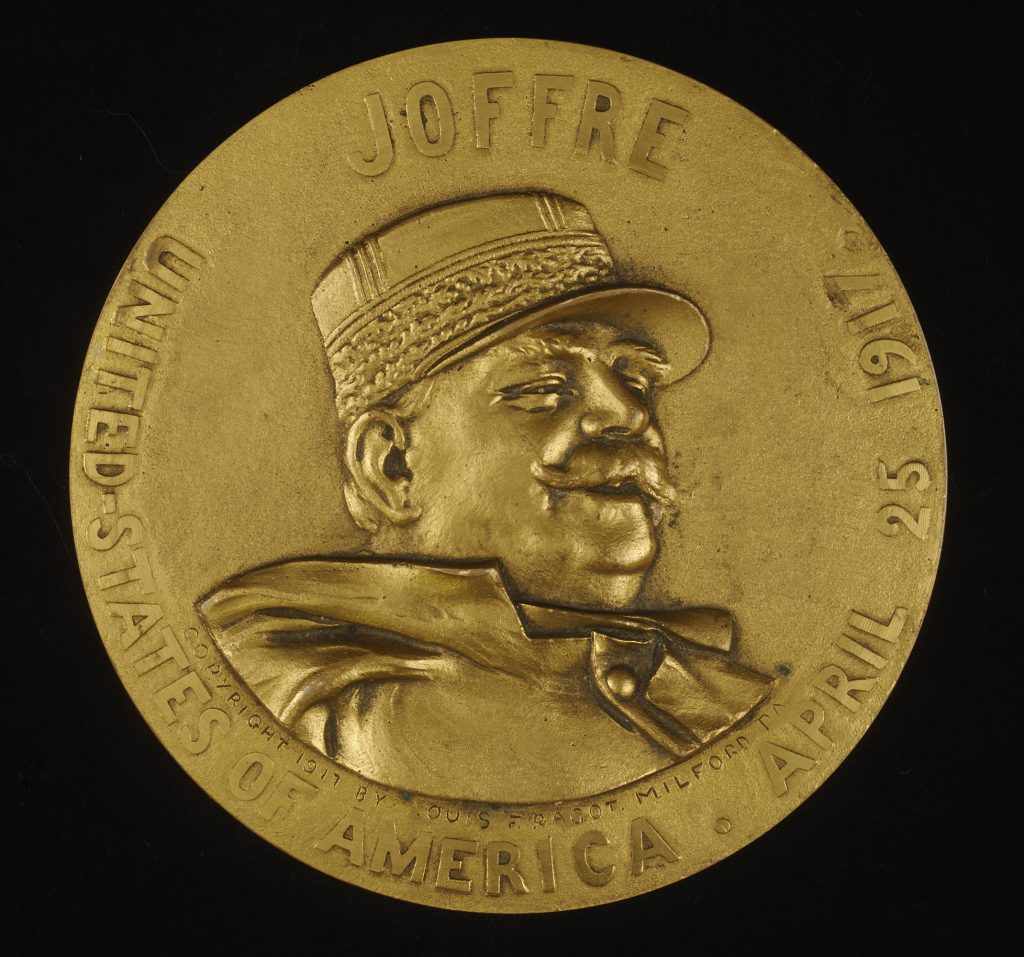
“Joffre — United States of America — April 25, 1917”
Louis F. Ragot
Struck by the Whitehead & Hoag Company, Newark, N.J., 1917The Society of the Cincinnati, Museum purchase, 2017
The French dispatched Marshal Joffre and former prime minster Rene Viviani to the United States in the spring of 1917 to rally American support for the allied cause. Louis Ragot, a French-born sculptor who emigrated to the United States in 1894, designed this large bronze medal to commemorate Joffre’s visit. Joffre visited Mount Vernon and Washington’s headquarters in Newburgh, New York, and participated in the dedication of a Lafayette memorial in Brooklyn.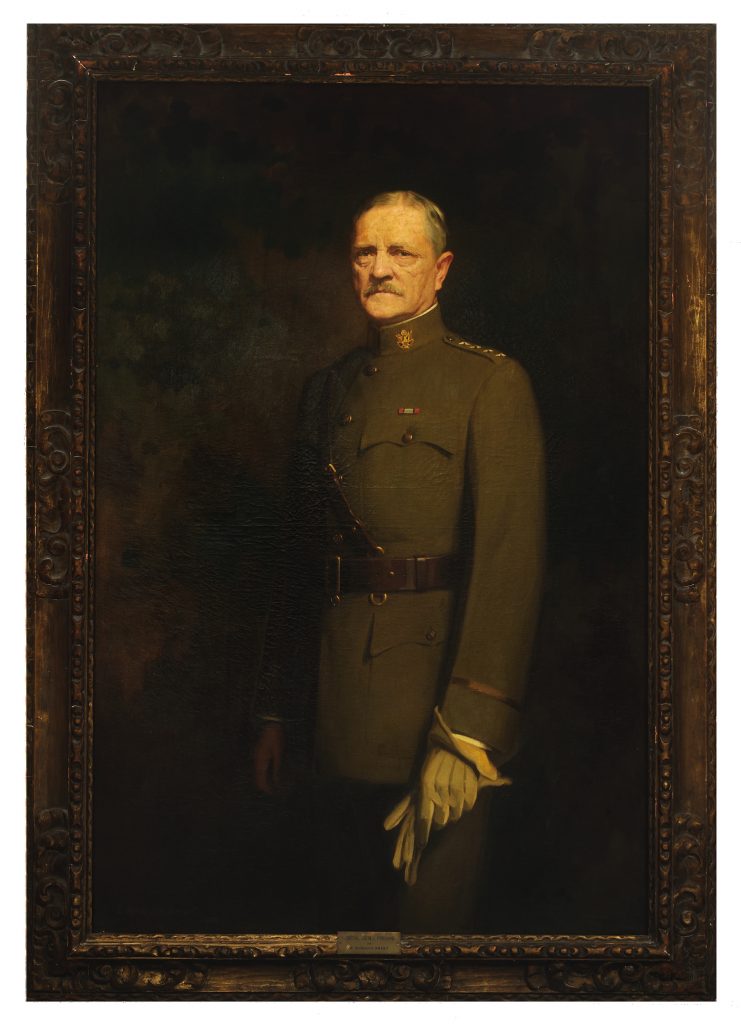
General John J. Pershing
E. Hodgson Smart (1873-1942)
1922Collection of Jack and Janet Warren
President Wilson appointed John J. Pershing to command the American Expeditionary Forces sent to Europe. Pershing was modest, reserved, dignified and disciplined, inviting comparisons to George Washington, whom Pershing regarded as the model American general. British artist E. Hodgson Smart painted this oil portrait of Pershing from life in Washington, D.C., in 1922. Although he had been awarded many decorations, Pershing wears only the ribbon of the Distinguished Service Medal, created in 1918 to honor exceptional army personnel for meritorious service to the United States in a duty of great responsibility in time of war.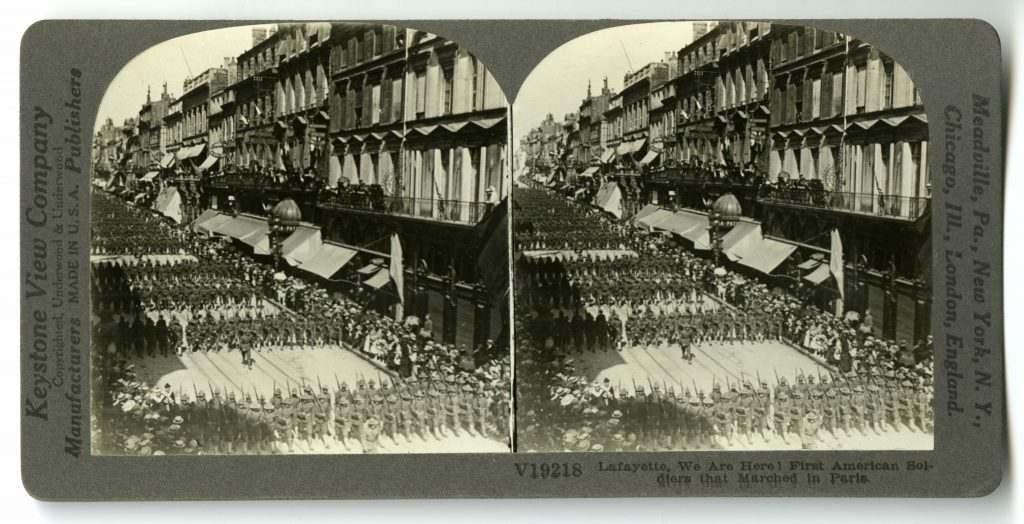
Lafayette We Are Here!
Meadville, Pa.: Keystone View Company, 1917The Society of the Cincinnati, Library purchase, 2016
Recognizing the importance of Joffre’s American tour for the French-American alliance, Pershing staged an ever more compelling spectacle shortly after he arrived in France with the first contingent of American troops. On July 4, 1917, a battalion of the Sixteenth Regiment of the First Division marched five miles from Les Invalides in the heart of Paris to the cemetery in Picpus, where Pershing and his staff paid a ceremonial visit to the grave of Lafayette.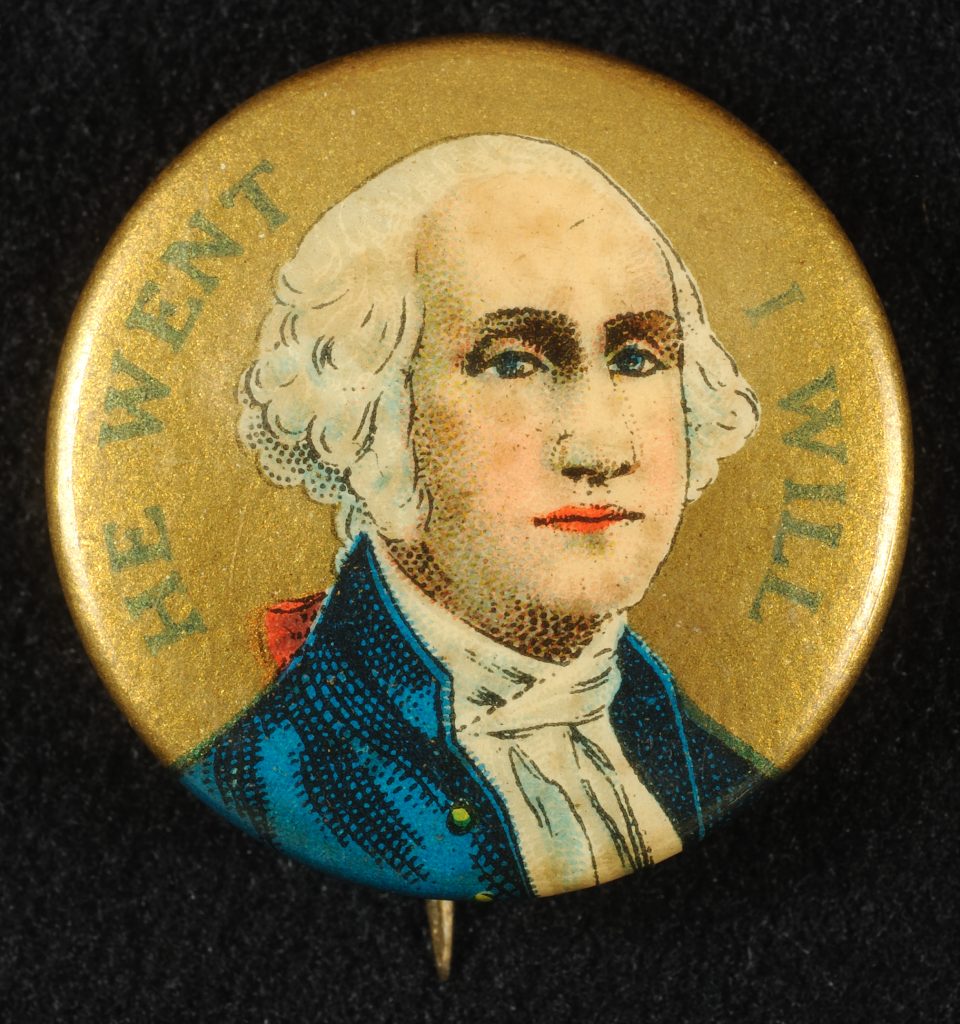
“He Went — I Will”
Bastian Brothers Company, Rochester, N.Y.
ca. 1917The Society of the Cincinnati, Museum purchase, 2016
The simple message on this souvenir pinback worn by army recruits in 1917 illustrates the enduring importance of the heroes of the Revolutionary War. General Pershing and his staff appealed to the legacy of the Revolution to strengthen the new alliance between the United States and France.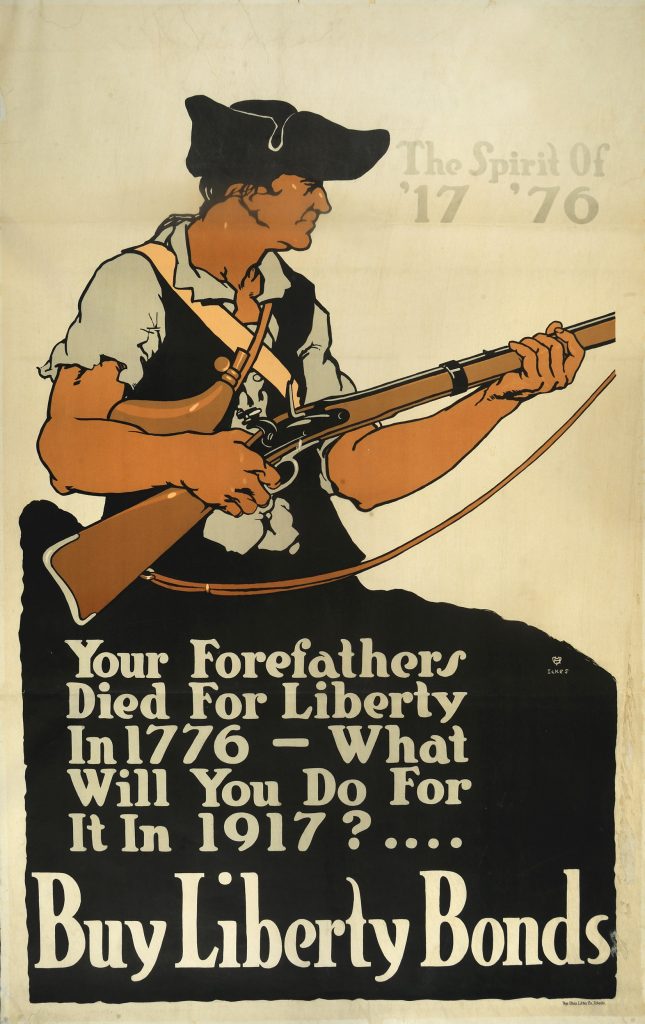
Your Forefathers Died For Liberty In 1776
Paul A. Ickes
Toledo, Ohio: Ohio Lithograph Company, 1917The Society of the Cincinnati, The Robert Charles Lawrence Fergusson Collection
The federal government financed the war through increased taxation and borrowing from ordinary Americans, chiefly through the sale of Liberty Bonds, which raised some $17 billion. Symbols and ideas from the American Revolution—including the Spirit of 1776, the Minuteman and the Liberty Bell—were invoked in every bond drive, reinforcing the idea that the war was a great crusade to vindicate the ideals of the revolutionary generation.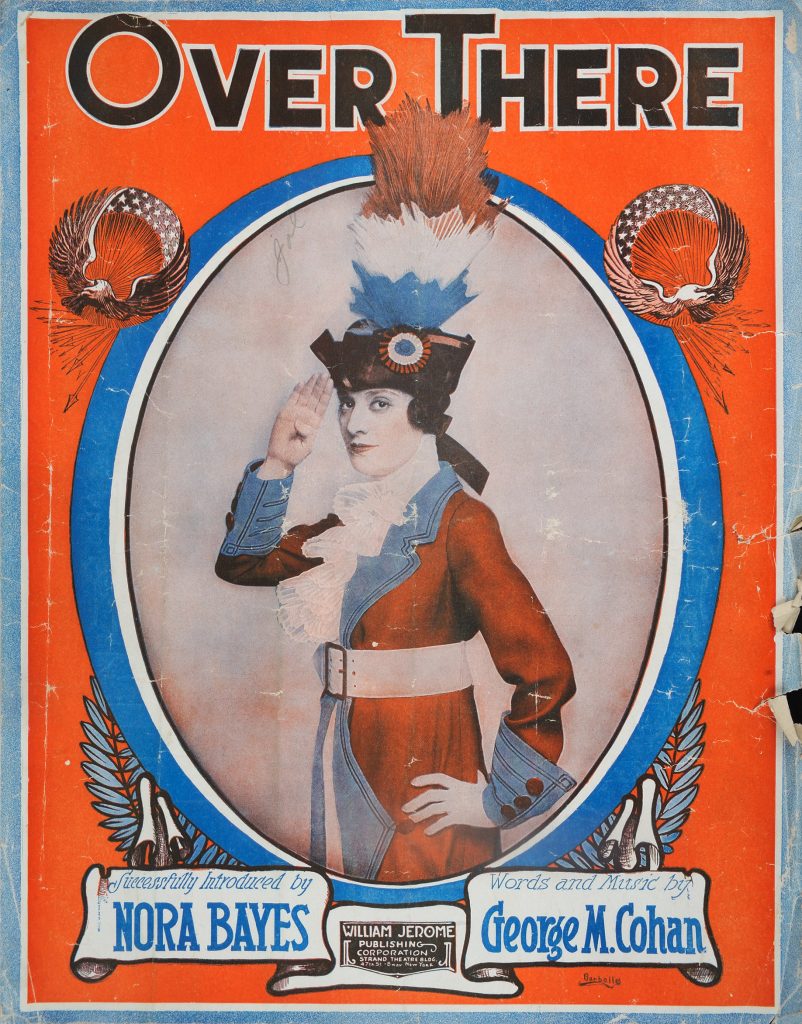
“Over There”
George M. Cohan
New York: William Jerome Publishing Corporation, 1917The Society of the Cincinnati, Library purchase, 2017
The best-known American song of World War I, “Over There” sold more than two million copies by the end of the war. Nora Bayes, a star of vaudeville and Broadway, was the first singer to record the song. She performed it hundreds of times at patriotic rallies and concerts, often appearing in this costume, inspired by Revolutionary War uniforms.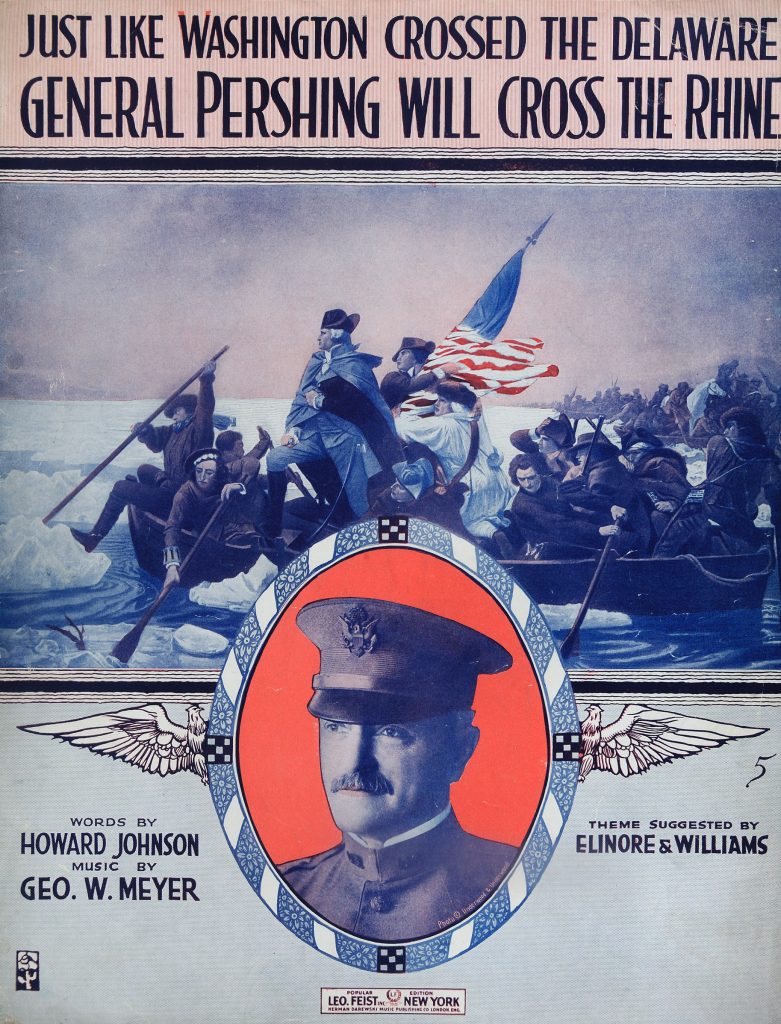
“Just Like Washington Crossed the Delaware, General Pershing Will Cross the Rhine”
Words by Howard Johnson, Music by George W. Meyer
New York: Leo Feist, Inc., 1918The Society of the Cincinnati, Library purchase, 2016
“Just Like Washington Crossed the Delaware, General Pershing Will Cross the Rhine” was one of the best-selling songs of late 1918, and one of many songs of the war inspired by the American Revolution. Others include “Lafayette, We Here You Calling,” “When Yankee Doodle Learned to Parlez Vous Francais” and “Liberty Bell (It’s Time to Ring Again).”![Click for a larger view. Kosciuszko, Pulawski walczyli o wolnosc w Ameryce, Brooklyn, N.Y.: Latham Lithography & Printing Co., [1917]](https://www.americanrevolutioninstitute.org/wp-content/uploads/2018/08/Kosciuszko-Pulawski-PE-L2013F204f-730x1024.jpg)
Kosciuszko, Pulawski walczyli o wolnosc w Ameryce
Brooklyn, N.Y.: Latham Lithography & Printing Co., [1917]The Society of the Cincinnati, The Robert Charles Lawrence Fergusson Collection
This 1917 poster reads “Kosciuszko, Pulaski – they fought for liberty in America. Will you help America fight for freedom in Poland? Eat less wheat, meat, fats, sugar, so we can aid our brothers fighting in the allied armies.”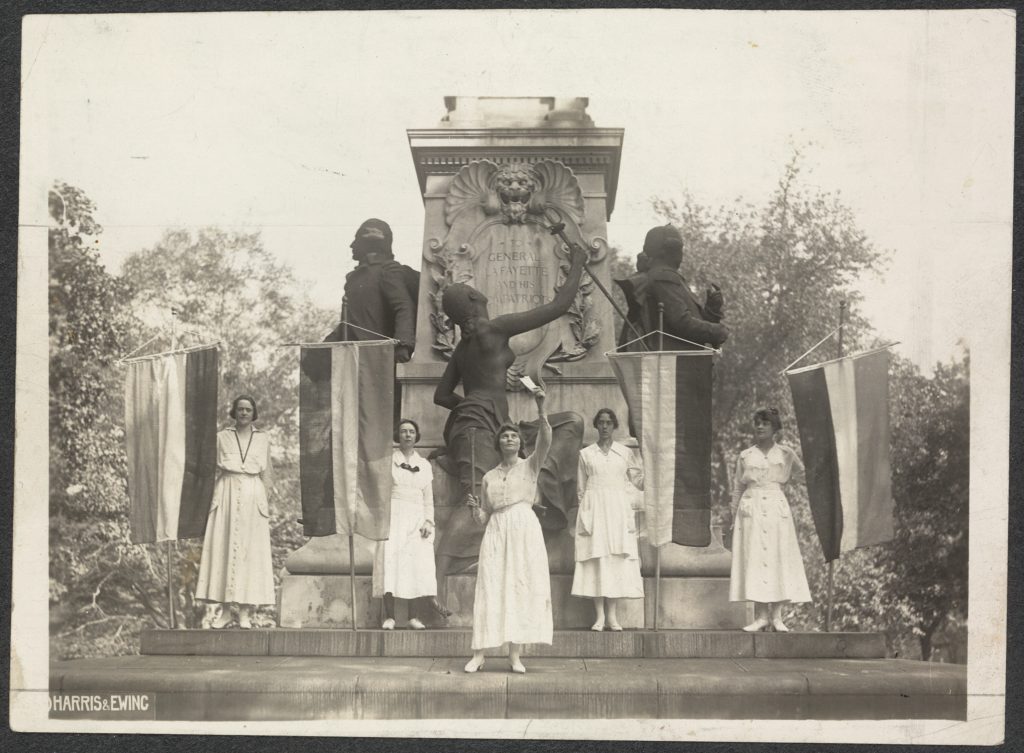
Suffrage protestors at the Lafayette statue in Washington, D.C., September 16, 1918
Harris & Ewing, 1918Library of Congress
On September 16, 1918, as Pershing’s army was fighting in France, members of the National American Woman Suffrage Association marched to the base of the statue of Lafayette less than a block from the White House. Twenty-five-year-old Lucy Branham held aloft a torch. “The torch which I hold symbolizes the burning indignation of women who for a hundred years have been given words without action.”![Click for a larger view. America Owes France the Most Unalterable Gratitude, Lucien Jonas, Paris: Imp. H. Chachoin, [1918]](https://www.americanrevolutioninstitute.org/wp-content/uploads/2018/08/America-owes-France-PE-L2008F124-770x1024.jpg)
America Owes France the Most Unalterable Gratitude
Lucien Jonas
Paris: Imp. H. Chachoin, [1918]The Society of the Cincinnati, The Robert Charles Lawrence Fergusson Collection
George Washington welcomes long ranks of French soldiers into heaven in this poster appealing for support for the American Ouvroir Funds, an umbrella organization for ten French charities caring for French war orphans. American charities continued to work to alleviate the suffering caused by the war through the 1920s, often appealing to American idealism and the memory of French aid to the United States in the Revolutionary War.